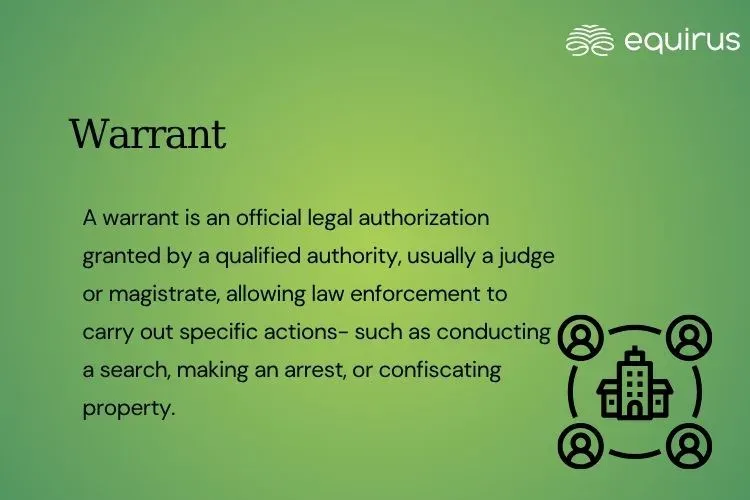Warrant

Key Highlights
-
A warrant is an official legal authorization granted by a qualified authority, usually a judge or magistrate, allowing law enforcement to carry out specific actions- such as conducting a search, making an arrest, or confiscating property.
-
Types of warrants includes call, put, company and structured warrants.
What is Warrant?
A warrant is an official legal authorization granted by a qualified authority, usually a judge or magistrate, allowing law enforcement to carry out specific actions- such as conducting a search, making an arrest, or confiscating property. Warrants are essential tools in the judicial system to ensure actions are conducted lawfully and with proper oversight.
Key Features
-
Who Issues Them: Usually the company itself, but sometimes banks or financial institutions issue them (unlike stock options, which come from third parties).
-
Exercise Price: The fixed price you can buy or sell the stock at.
-
Expiration Date: Warrants often last for years, giving you plenty of time to decide. American warrants can be used anytime before they expire, while European warrants can only be used on the expiration date.
-
Dilution: When you use a warrant to buy shares, the company creates new ones, which can slightly reduce the value of existing shares.
-
No Extras: Warrants don’t give you dividends or voting rights until you turn them into actual shares.
Types of Warrants
-
Call Warrants: Let you buy the stock at a set price before the deadline.
-
Put Warrants: Let you sell the stock at a set price before the deadline.
-
Company Warrants: Issued by a company that give investors the right to purchase newly issued shares at a predetermined price within a specified time frame.
-
Structured Warrants: Issued by financial institutions, letting you buy or sell an asset (like stocks or commodities) at a fixed price later.
Why Use Warrants?
-
Boost Your Investment: Warrants let you control more stock with less money, amplifying gains (or losses) compared to buying the stock outright.
-
Protect Your Portfolio: Pairing a put warrant with stocks you own can act like insurance against price drops.
-
Attract Investors: Companies offer warrants with stock or bond deals to make them more appealing, like a bonus to sweeten the deal.
-
Profit from Price Swings: Warrants can magnify price movements, making them attractive for investors betting on big changes.
